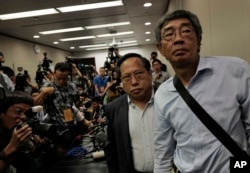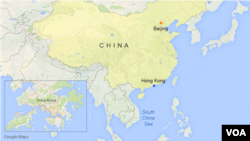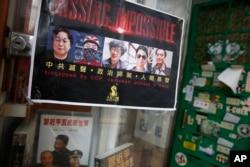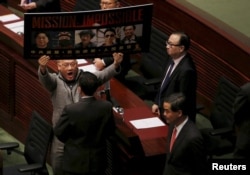One of five Hong Kong booksellers who went missing under mysterious circumstances last year spoke out Thursday, saying he had been detained for more than eight months by Beijing officials and that another of the five had been abducted from Hong Kong.
Lam Wing-kee, whose bookstore sold gossipy books about China's political leadership, told a news conference that his colleague, Lee Bo, who went missing from Hong Kong, had been abducted in "cross-border enforcement actions" by mainland Chinese police, who were out of their jurisdiction when they conducted the raid.
Lam, who was detained by Chinese police for more than eight months and returned to Hong Kong early Tuesday, discussed his ordeal at the Hong Kong Legislative Council, where he was accompanied by councilor Albert Ho, Chairman of the China Human Rights Lawyers Concern Group.
Lam said he was detained at customs on October 24 while on his way to visit friends in mainland China, when about 10 Chinese security officials took him to a scrap yard in Shenzhen, where they confiscated his ID and other documents.
He was later taken to a police station and held overnight. The abductors gave him food, but refused to answer his question as to why he was detained.
Taken by train
The next morning he was taken by train to Ningbo, a city to the north in China's Zhejiang Province. During the 13-hour train ride, he was forced to wear dark goggles and a cap, presumably to obscure both his eyesight and identity.
Shortly after arriving in Ningbo, the goggles finally removed, he found himself in a dingy padded room on the second floor of a large building, where he was physically examined, asked to change clothes, and forced to sign a document promising to forfeit contact with family and waive the right to hire an attorney. After that, Lam said, he was watched day and night by six rotating pairs of guards.
Lam said he was interrogated at least 30 times in that building, during which he told his captors that he ran a decent bookstore that abided Hong Kong law. The Chinese police, however, accused him of violating domestic law by sending or delivering the banned books to customers on the mainland.
According to Lam, he was released in March this year but was not allowed to leave a specified area. Chinese officials finally allowed him to go home on the condition that he return to the bookstore to secure a hard drive containing buyer information and hand it over.
While detained, Lam said Chinese authorities asked him to identify buyers, but he refused, saying he didn’t want to betray them. Lam also said Chinese police claimed to have information on "about five to six hundred readers and buyers, most of whom [reside in] mainland China.”
Five other booksellers linked to Causeway Bay Books went missing late last year before surfacing in Chinese police custody. Lam was the fourth of the five to return to Hong Kong, and did so early Tuesday.
In a statement issued by Hong Kong police on Tuesday, Lam, upon his arrival, asked to have his missing person case canceled, explaining that he did not need any assistance from the government.
Won't return to mainland China
Lam said at Thursday’s news conference that he planned to return to mainland China with the requested hard drive, but that he changed his mind after much internal deliberation. He was already bound for mainland China when he got off the subway and immediately sought contact with Hong Kong officials.
Lam said he changed his mind after reflecting on the thousands of Hong Kong residents who marched in the street to support the missing booksellers. As a lifelong Hong Kong native, he said, he felt compelled to speak out "or Hong Kong won’t be saved."
"The Causeway Bay Books event touched the bottom line of Hong Kong people,” he said. "I hate to see further repression of Hong Kong’s freedom. It's not just about me or one bookstore, it's about fighting for freedom for the Hong Kong society."
Before Lam spoke out, many people in Hong Kong had suspected that mainland officials illegally abducted the five booksellers, sparking fears that China's domestic security apparatus was overriding the "one country, two systems" framework that protects the Hong Kong Basic Law, the guiding constitutional document of the Hong Kong Special Administrative Region, which has been in place since Hong Kong's return to China from British rule in 1997.
Chinese authorities have declined to clarify key details of the disappearances, but one official told VOA that law enforcement officials would never do anything illegal.
Hong Kong lawmakers react
Shortly after Lam's remarks, some Hong Kong lawmakers called on the government to continue investigating the disappearances of the five booksellers.
Labor Party lawmaker Lee Cheuk-yan said that even if Lam had asked police to close the case, the event remains full of "mystery" that the Hong Kong government is responsible to investigate.
Democratic Party lawmaker James To Kun-sun said that Beijing government must give a full account of the event, or Hong Kong people would worry about their own safety.
Ip Kwok-him, a pro-Beijing member of Hong Kong's legislative council, opposed calls for further investigation, claiming that Lam's return has brought the matter to rest. The fact that four of the five booksellers asked to have their missing person cases closed, he said, annuls grounds for a government-led probe.
While the other booksellers could follow suit by retracting their requests for case closure, Liu Ruishao, a Hong Kong News commentator, told VOA he doubted it was likely. People close to Lam, he said, suggest that he was the last of the four to be released because he had no family members living on the mainland for authorities to hold hostage to leverage his compliance.
Store closure
The Causeway Bay Bookstore closed after the five disappeared, with all its books sent to a paper mill, including “2017 China Changes,” by Liu Lu, a U.S.-based Chinese writer-in-exile. Liu said he cannot secure another contract on the manuscript, as Hong Kong publishers are now afraid of reprisals.
"Sometimes the contents of these books may be no problem, but because of the publicity, publishers think it could be a problem, so they won’t publish it," Liu Dawen, a Hong Kong-based publisher and president of "Sentinel" magazine, told VOA.
Similarly, a new book by a prominent Chinese human rights lawyer Gao Zhisheng, who wrote about his repeated jailings and torture by Chinese police, has been unable to publish his new book, "2017, Stand Up China: The Story of Tortured Human Rights Lawyer Gao Zhisheng,” which was released in Taiwan last Saturday.
This report was produced in collaboration with VOA's Mandarin Service.








